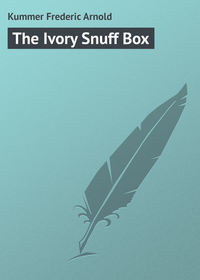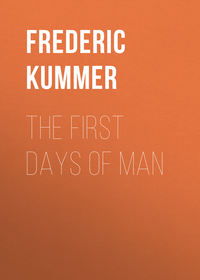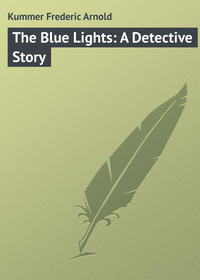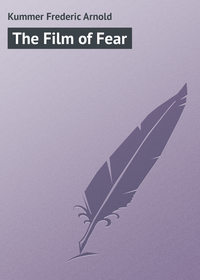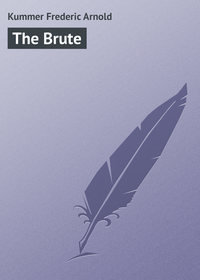 полная версия
полная версияThe Green God
I hastened to my room, therefore, intending to pack my belongings before luncheon, so as to be ready for a start as soon thereafter as the detective was ready. I left the door of my room partially open upon entering, and for a time busied myself in arranging my luggage. As I did so, I thought I heard a slight sound in the green room across the hall – the one in which the tragedy had occurred – and, glancing up, saw that, by looking into the mirror of my dresser, I could see most of the interior of the room opposite. The room was not empty – for in a moment I observed Li Min, the Chinese servant, engaged apparently in arranging it, now that its unfortunate occupant and his belongings had been removed. His actions struck me as being decidedly peculiar, and I watched him carefully as he moved about. He was evidently searching for something, and examined with the most minute care every object in the room – the carpet, the pictures, the furniture, even the wall paper, as though looking for some place of concealment. I tried to figure this out to myself, but I could see no reasonable explanation of his conduct. If he, or any of his confederates had killed Ashton, they certainly must have secured the emerald Buddha, and taken it with them – the empty case, I remembered, lay upon the table. What then, could this Chinaman be searching for with such evident eagerness and anxiety? I determined to surprise him, and with a few rapid steps crossed the intervening hall and appeared in the doorway. He at once seemed confused, and made a quick pretense of being busily occupied in the business of setting the room to rights. I stood looking at him questioningly for a few moments, when I presently became aware of a curiously pungent, yet sweet, aromatic odor, which had something vaguely familiar to me about it. I could not, at first, place this perfume, which was noticeably different from those of our own country, when suddenly it flashed into my mind that this was the curious scent which I had noticed upon Miss Temple's handkerchief – the one dropped by her in Ashton's room on the occasion of her visit to him shortly before midnight on the evening preceding the tragedy. I glanced about, thinking to discover the source of this perfume, but for a time had difficulty in doing so. At last, however, I found that it came from a small cake of soap, of a dull-green color, which lay upon the washstand where it had evidently been left by Ashton. I picked up the soap and examined it, and at once recognized the pungent odor of which I have spoken. The coincidence struck me as being queer – the presence of this same perfume upon Miss Temple's handkerchief – and I was at a loss to account for it. I picked up the cake of soap, observing its perfume closely, then, noticing that the Chinaman was regarding me with a particularly malevolent gaze, I retired to my room, taking the soap with me. I had no definite purpose in this except to keep it in order to identify the perfume, and, upon returning to my room threw it into my satchel and completed the arrangements for my departure.
I was soon ready to go, and, after leaving my bag with one of McQuade's men, who was to accompany us to the railway station, I sought Miss Temple in the hope of saying good-by to her before my departure. I was lucky enough to find her in the library, sewing, and looking unusually pale and distressed. She greeted me with rising color, and I confess that I, too, felt a trifle of embarrassment. I could not forget her agitation of the day before when I had questioned her as to her movements upon the morning of the tragedy and her flat refusal to continue the conversation when I had pressed her to explain her reasons for her early morning expedition as well as her sudden return. I stood gazing at her in perplexity, but, as I did so, the beauty of her face, the clear, honest expression of her eyes once more convinced me that whatever were her reasons for silence they did not in any way implicate her in this tangled affair.
"I have come to say good-by," I said.
"Oh, are you going – I did not know." She half rose; her face filled with lively concern.
"I'm afraid I've already overstayed my time," I replied. "After all, Miss Temple, I came as a stranger and must thank you and your father for making me as welcome as you have under the existing painful circumstances."
"I have not thought of you as a stranger, Mr. Morgan," she answered simply. "You have been a great help during this trying ordeal, and I am sorry that you must go – very sorry." There was a ring of sincerity in her voice that thrilled me; my heart gave a leap, and, as I met her eyes, I realized all of a sudden that, go where I might, I could not yet go very far away from Muriel Temple. "I do not go because I desire it," I replied, in a voice from which I could not eliminate the depth and intensity of my feelings. "I am no longer needed here, and it is in the hope that I may perhaps be of some service to you in London that I have asked Sergeant McQuade's permission to accompany him there to-day. I have taken the deepest interest in this terrible affair, Miss Temple, and, if it lies in my power, I intend to find the solution of it. My reward, if I can do so, will be the knowledge that I have served you."
"You are very good, Mr. Morgan. I shall never forget it, never." She rose and placed her hand in mine, and allowed it to remain there for a moment – a moment which seemed far too short to me, since I had suddenly realized that I should be madly happy could I know that I would have the right to keep it there always. "And, when you have good news, you will come to The Oaks and tell us about it, will you not?" she concluded, with a smile that went to my heart.
"Indeed I shall, Miss Temple – you may be sure of that – and I hope it may be soon."
"So do I," she said, and I turned to leave her. Then I suddenly bethought myself of the strange Oriental perfume that had clung so strongly to the handkerchief which the detective had found in the green room. I turned to her once more. "Miss Temple," I said, with some hesitation, "you will pardon me, I know, but you may remember that the handkerchief which was found in Mr. Ashton's room upon the morning of the – the tragedy, and which you thought you might have dropped there, was strongly scented with a powerful Oriental perfume. May I ask what that perfume is, and where you procured it?"
"Perfume?" she ejaculated, in surprise. "Why, Mr. Morgan, I never use any – never."
"You never use any?" I stammered. "But it was upon your handkerchief. I thought that perhaps you might have gotten it during your travels in China."
"The handkerchief was mine, Mr. Morgan – that is true. But of the perfume I know absolutely nothing. Why do you ask?"
I hardly knew what reply to make. The whole affair seemed absurdly trivial; the identity of the perfume of the soap, and of the handkerchief meant nothing, pointed to nothing, and yet I could not shake off the idea that there was some intimate connection between the perfume of the handkerchief and that of the soap which would go far toward solving the mystery of Robert Ashton's death. I bade her good-by with some simple explanation of my question, and hurried out to find McQuade. I understood that he intended going in to Exeter before luncheon, getting a bite to eat there, and taking the early afternoon express for London. I found him with one of his men upon the porch roof, busily engaged in making photographs of the bloody hand print upon the window sill of the green room. He came down presently and joined me.
"Is it not a curious fact, Mr. Morgan," he remarked, as he reached the foot of the short ladder he had used to ascend to the roof, "that, although Li Min had not only the motive for the murder, namely, the securing of the emerald Buddha, but also the opportunity, inasmuch as he could readily have reached the porch roof from within the house by means of the hall window, and while the hand print which I have been photographing is small and delicate, like that of a woman, or indeed like that of Li Min himself, yet I have tested every possible human means whereby the windows and doors of that room could have been bolted after the crime was committed, and I can see no possible way in which it could have been done, unless either Major Temple or yourself did it upon entering the room, which you certainly would neither of you have any reason to do were Li Min the guilty person? In spite of many of the peculiarities of Miss Temple's conduct, in spite of Major Temple's altercation with Mr. Ashton, I have been prepared to believe all along that Li Min was on this roof at or near daybreak yesterday morning and I do not mind telling you that I have discovered certain evidence – evidence which had before escaped me, that to my mind proves it conclusively – yet how he could have entered that room, murdered Mr. Ashton, secured the jewel, climbed out of the window and shut and bolted it behind him on the inside is beyond my comprehension. It is not humanly possible – it simply cannot be." He shook his head and looked at me in a state of evident perplexity.
I felt unable to offer any suggestions of value, but I hazarded a question. "Have you searched the attic above the room?" I asked.
"Thoroughly," he replied. "The rafters have never been floored over. The lath and plaster of the ceiling are absolutely unbroken. As for the four walls, two of them are exterior walls, without openings, except the windows. One is the solid partition between the room and the hallway. The fourth is equally solid, and of brick, between the green room and a large closet adjoining it to the east, which has evidently been used as a sort of lumber room, and contains a collection of old furniture, carpets, etc., covered with dust half an inch deep. The dust-covered floor and the rusty lock both show that it has not been entered for a long time. The furniture belongs to the owners of the property, and was evidently placed there years ago when the property was offered for leasing."
"Then it would seem that we have exhausted all possible clews," I observed. I did not think it worth while to take him into my confidence regarding Li Min, or the perfumed soap; and the brass-headed poker which I had found, and which I had placed in the drawer in my room, I had for the moment completely forgotten.
"So it seems," he remarked, thoughtfully. "This is by long odds the strangest case I have ever worked on. Possibly the two Chinamen we have in London may be able to throw some light upon it."
As we rounded the corner of the house, on our way to the front door, we suddenly saw Li Min dart out of the main entrance, closely pursued by the officer to whom I had entrusted my luggage. The Chinaman carried in his hand my Gladstone bag, and was running with incredible swiftness toward the road. Before I had time to make a move, McQuade darted forward and intercepted him, knocking from his hand with lightning-like quickness a long knife which he drew from his blouse. The two of them tumbled over upon the turf, McQuade rising first with my satchel in his hand. He looked at it, and seeing my name upon it handed it to me with a grim smile. "You must have a valuable kit here, Sir," he said, "or else this fellow has taken leave of his senses." He nodded to his assistant, who promptly stepped forward and snapped a pair of handcuffs upon the sullen-looking Oriental.
"The whole outfit isn't worth five pounds," I said, laughing, and picked up the satchel. As I did so the catch came open and my small collection of flannel shirts, toilet articles, sketching materials, etc., tumbled upon the grass. McQuade joined in my laugh, and assisted me in replacing my effects. "Nothing much here, Sir," he said, but I did not fail to notice that he observed each article closely as we repacked the satchel.
We drove back to town in the high cart, with one of Major Temple's grooms at the reins beside me, and Li Min and the Sergeant upon the rear seat. After depositing the Chinaman at the jail, we took a hurried lunch at the Half Moon, and left for London on the early afternoon express, arriving at Waterloo station about dusk. I gave McQuade the address of my lodgings and studio in Tottenham Court Road, and, as he intended reporting at once at Scotland Yard, I left him with the understanding that, if anything significant developed during his examination of the two Chinamen, he would advise me and call upon me if I could assist him in any way. I realized of course that I was purely an outsider, and in no position to expect the police to take me into their confidence, but on the other hand I was not only the most important witness in the case, but my keen interest in the solution of the mystery, for the purpose of clearing the names of both Miss Temple and her father from any vestige of suspicion, was not lost upon the Sergeant, and I think he realized that I might be of considerable assistance to him should the case take some unexpected turn. He hurried off in a hansom and I followed, stopping on my way at the Vienna Café for dinner. It was past eight when I arrived at my studio, and, throwing my bag into a corner I sat down and wrote a letter to my mother at Torquay, explaining to her my change of plans, although making no mention of the reasons which caused the change. I must have been unusually tired, owing to my early rise and the varied excitements of the day, for I dozed in my chair, and was not aroused until after eleven, when I heard a loud knock at the studio door. I sprang up, somewhat confused, and, opening the door, found under it an envelope containing a note, written on plain, rather cheap paper, in a somewhat irregular but legible hand. It was from McQuade, and requested me to meet him at once at Number 30, Kingsgate Street. There was nothing else in the note, so without further delay I threw on a warm coat and soft hat, and, hurrying to the street, summoned a cab. The driver looked a bit surprised at the address, and asked me to repeat it, which I did a bit sharply, then threw myself into the rear seat and lighted a cigarette. Events were moving quickly it seemed. McQuade, I felt sure would not have sent for me at this hour of the night unless some developments of importance had occurred. I rejoiced in the hope that the examination of the two Exeter Chinamen had resulted in the discovery of both the missing jewel and the murderer, and thought with pleasure of the expedition I should make on the morrow to The Oaks and the happy tidings I should bring to Muriel. I had thought of her so continuously, since leaving there, and felt so keenly the loss of her companionship, slight as it had so far been, that I knew that hereafter all roads, for me, would lead to Exeter until the day came when I might lead her from it as my wife. It was while occupied in these dreams that I felt my cab draw up alongside the curb, just as the hour of midnight was striking from Old St. Paul's. I dismissed my man with a shilling for his pains, and ascended the steps of Number 30.
The house was an old one, and its exterior was gloomy and forbidding. Not a light shone in its closely shuttered windows, and only over the transom of the door was there any visible sign of occupants within. Here a faintly burning oil lamp shone behind a cobwebby glass, with the number of the house painted upon it in black. The whole atmosphere of the place was depressing in the extreme, and I pulled the bell with feelings of inward trepidation. Without, all was silent and deserted, and the starless sky and the sighing of wind through the gloomy streets, from which my cab had long since departed, but added to my presentiments of evil. I had heard the faint jangle of a bell in the interior of the house when I pulled the knob, but so long an interval elapsed before any response came that I was on the point of ringing it again, when I suddenly heard soft footsteps in the hallway, and the door was silently opened. I stepped within, mechanically, unable to observe the person who had admitted me, owing to the fact that he or she, I knew not which, stood partially behind the door as it swung open and was therefore concealed by it. I had taken but a single step into the passage, when the door was swiftly closed behind me, and at the same instant a bag of heavy cloth was thrust over my head, and my arms were pinioned from behind in a vise-like grip. I attempted an outcry, and struggled violently, but the bag was drawn closely about my throat by a noose in the edge of it, and I felt myself being slowly, but surely, strangled.
CHAPTER VII
IN THE TEMPLE OF BUDDHA
It was but a few moments after midnight, when I entered the house in Kingsgate Street, and it must have been nearly or quite an hour before I finally removed the bag from my head and realized the nature of my surroundings. Immediately after the attack upon me, I was lifted bodily by two or three silent figures, and carried a considerable distance, part of the way down a steep flight of stairs, and through what from its damp and musty smell might have been a tunnel or cellar. Presently I heard the opening of a heavy door, and in a moment I was thrown roughly upon a bench, and my pockets were systematically searched. My captors evidently were not looking for money for the only things they took from me were my keys. After this they left me, huddled up in a corner of the bench, afraid to cry out or make a move in any direction.
The room in which I now found myself was as silent as the tomb, and yet, from some subtle instinct, I felt that it was lighted brightly, and that there were others in it besides myself. I could feel that it was warm, and through the folds of the bag about my head came the acrid, half-sweet smell of opium or Chinese incense, or both. I realized at once that I was in the hands of some of Li Min's friends, and no doubt the note which purported to come from McQuade had been merely a decoy. How, I wondered, did they know my address? Possibly they had followed my cab from the station. I recollected now with vividness the interview I had witnessed, the afternoon before, between Li Min and some fellow countryman of his at the gateway in the hedge back of The Oaks. No doubt the crafty Oriental had in some way kept his confederates in London fully posted as to both my movements and those of Sergeant McQuade. What on earth they could want with me I was unable to imagine. I reached out softly with my right hand – I had not been bound – and touched a wall, hung with heavy embroidered satin. The bench upon which I sat was of hard polished wood. I reached up quickly, loosed the cord which held the bag tightly about my neck, and, with a swift motion, lifted it from my head.
The sight I beheld astounded me. I was in a long, low room, the bench upon which I sat being at the extreme end of it. The walls were hung from end to end with bright-colored satin, wonderfully embroidered with birds, flowers, dragons and strange Chinese characters. The floor was of wood, dark, and polished with the walking of many soft-shod feet. Facing me at the far end of the room was a great red-and-gold wooden screen, carved and lacquered, and representing some mysterious Chinese figures, whether gods or demons I could not tell. In the center of this screen was an opening, a sort of altar, brightly lighted by a large number of wax candles within which hung a representation of the god Buddha, marvelously embroidered upon dull red satin, with gold and silver threads. Behind the candles stood a small gold casket, or shrine, the door of which was standing open, disclosing an empty interior. The altar in front of the candles was covered with a profusion of dishes containing flowers, rice and other foods. Before the altar knelt a tall, gaunt figure, his back turned toward me, bowed in prayer. He wore a long, dark-brown robe, girdled loosely about the waist with a leather belt, and his gray hair was confined in a long queue which hung below his waist. He took no notice whatever of my movements, and remained in silent contemplation of the picture of the god before him. A number of sticks of incense were burning in a brass jar upon the altar, and the room was filled with a thin, waving blue haze, which circled softly around the great painted silk lanterns which hung from the ceiling. I felt as though I had been suddenly and mysteriously transported from a dark and gloomy London street to some wonderful temple in the far-off city of Pekin. I rubbed my eyes, and moved uneasily upon my hard bench, but no movement upon the part of the silent worshiper indicated that he so much as knew of my presence.
I endured the tension of the situation for several minutes in silence, and had about made up my mind to speak to the kneeling figure before me, when suddenly a door at my left was opened, and I observed two dark and forbidding-looking Chinamen enter, carrying between them a limp and apparently lifeless figure, which they placed upon the bench beside me. The figure was that of a man, and he was not blindfolded as I had been, and, as I bent over and glanced at his bloodless face, I recoiled, sick and trembling. It was Sergeant McQuade.
The Chinamen paid no attention to me, and quietly withdrew. I placed my hand upon the detective's heart, and was overjoyed to find that it still beat. I dragged him to a sitting position, and shook him, hoping to arouse him from his lethargy. In a few moments I saw his eyes slowly open, and he clutched feebly at his throat. I followed his movements and found a heavy cord about his neck, so tightly drawn as almost to prevent him from breathing. This I quickly removed, and in a few moments he was able to speak. His first words, after a glance of intense surprise at our surroundings, were to ask me why I had sent for him. I told him that I had not done so.
"But you sent me a note, asking me to come to this address at once, that you had important news. I have two men outside, but these devils got me before I could blow my whistle. Not much use to try it now," he observed, looking about grimly.
"I sent you no note," I replied. "On the contrary, I got one from you. That is why I am here."
"We are both nicely trapped, it seems," he growled. "I wonder what these fellows are up to. They have searched me, but they took nothing, so far as I can see. I can't figure the thing out at all. What have you learned – anything?" He turned to me with a quick look of interrogation.
"Nothing. They took my bunch of keys, and left me here about an hour ago. I am as much in the dark as you are."
"Your keys," he muttered, softly; "your keys. What could they have wanted with them?" He seemed lost in thought.
Our further conversation was interrupted by the sudden opening of the door on our left. Some score or more of Chinamen crowded in, and were at once joined by the figure of the priest, who rose to his feet and advanced toward the center of the room. He was a terrible-looking old man, his face drawn and leathery, his eyes like burning coals, his mouth cruel and thin-lipped. All the others seemed to pay him deep respect. One of their number advanced and handed him a large object which he eagerly grasped. It was my Gladstone bag. McQuade and I glanced at each other in sudden comprehension. "It's my bag," I whispered to him. Now I knew at least why they had taken from me my keys.
The old priest placed the bag upon the floor and, kneeling beside it, proceeded to open it with eager, trembling hands. The others crowded about, every face tense and full of expectation. The kneeling figure proceeded slowly to remove and examine every article of clothing, throwing each one impatiently aside as he apparently failed to find that for which he sought. Presently his eye fell upon the small, green cake of soap which I had thrown loosely into the bag upon my departure from The Oaks. He seized it with a cry of triumph, and, taking a knife from his girdle, proceeded with extreme care to cut the cake of soap in two. The crowding figures about him hung upon his movements with intense anxiety. The room was as silent as death. I heard McQuade's muffled breathing as he watched the old man's every move, but I could see from the expression of his face that the scene meant no more to him than it did to me. Suddenly, with a loud cry, the priest broke the cake of soap in two, and there, within it, in a cavity about two inches long, lay the lost emerald Buddha, its wonderful color flashing and glowing in the light from the lantern above. I was absolutely dumb with amazement. Undeniably there before me lay the cause of Mr. Ashton's death, yet how it came to be in that cake of soap, and what light its presence there threw upon the manner of his sudden and tragic end, was beyond my comprehension. At least, however, I understood why Li Min had tried to make away with my satchel, but the fact that the presence of the jewel among my belongings might cause suspicion to point in my direction did not for the moment occur to me. It evidently did, however, to McQuade, as I before long had reason to know.


